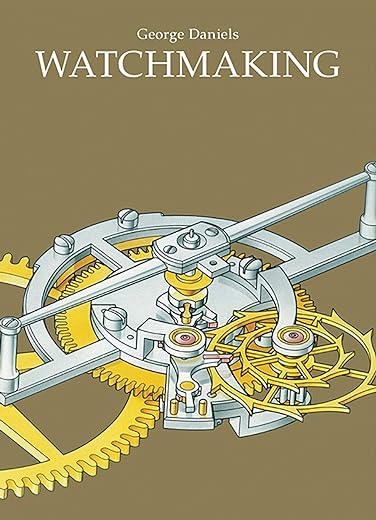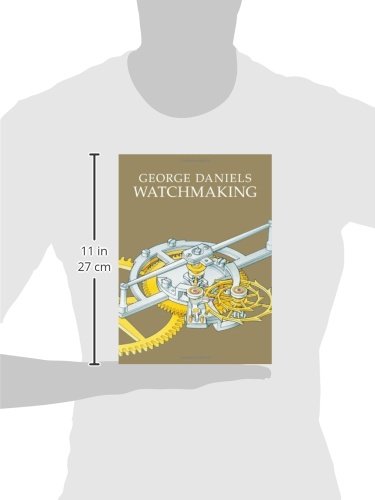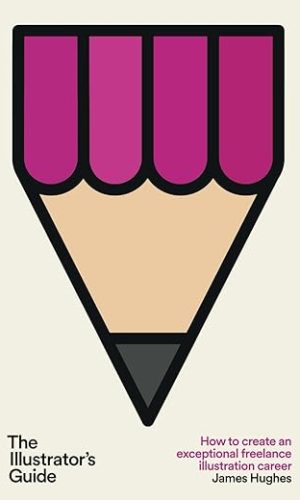Watchmaking
£52.30
Here, the making of the precision timekeeper is described step-by-step and illustrated at each stage with line drawings and brief explanatory captions. The text is easy to follow and care has been taken to avoid complicated technical descriptions. As Daniels is particularly interested in the development of the escapement – many are described in this book, several of his own design – the reader is encouraged to explore this aspect of watchmaking in even greater detail.
This classic handbook still remains indispensable to generations of watchmakers and repairers, and also provides a fascinating insight to the enthusiast and watch-collector who, until its publication, had rarely been able to admire the superb craftsmanship of a fine watch without understanding how it works.
Read more
Additional information
| Publisher | Philip Wilson Publishers Ltd, New edition (3 May 2011) |
|---|---|
| Language | English |
| Hardcover | 464 pages |
| ISBN-10 | 0856677043 |
| ISBN-13 | 978-0856677045 |
| Dimensions | 20.32 x 3.18 x 27.31 cm |












by Wella
High quality book. very comprehensive and informative
by not_bob
A great book if you are interested in watchmaking – the real kind where you are literally making a watch (from scratch). There are other books which are excellent for repair, but this book takes it a step further. Well written, it is both an easy read and full of information, pictures, etc. I haven’t made it very far yet, but what I have read is excellent. Starts with the basics (placement of benches, how to set up a workshop, placement and types of lights, etc) then continues to lathe types, etc. An excellent resource for someone who wants to do more than just fix watches. While it is written in a way that basically anyone with a foundation in highschool math can understand it, it is really intended for people in the industry who are serious about making parts from scratch. Having said that, the illustrations alone would make it a nice book for a doctor’s office. Well worth the investment if watches are your thing.
by Ricardo
Incredible book for anyone interested in clocks, watches or mechanics in general.
Beautiful.
by Mal Moy
I purchased this book after reading George Daniels fascinating obituary. I knew nothing about Mr Daniels before this so after some quick research on the internet this book seemed to be the one to read.
I came to this book with no watch knowledge but a large amount on engineering curiosity. My overriding feeling reading this book is the insanity needed to complete these stunning machines. I use that word with the gentlest of meaning. I had never before considered how the tiny was constructed or fully appreciate how astonishing mechanical watches are. The book does not hold back and from the first paragraph you are being taught how to make a world class watch. Soon however it all starts to make sense and with a few referrals to Wikipedia the processes and mechanisms are easily understood. The diagrams are perfect and show in detail the subtleties and beauty of the components. As I have never read any other watch book I cannot compare it but if I measure against the technical books I usually read I would have to put it at or near the top, it really is as close to perfection as you could ask for when writing about such a niche subject.
by Norbzilla
This book is for you if:
You are at the verge of making your own watch
Want to know how a watch is made
You’re a watch nerd and everything that has the word ‘watch ‘ in it, needs to be bought.
On the serious note, this book is fantastically detailed and a good source of knowledge when it comes to watch making and the tools you’ll need to do so. So, if this is what you want to know. The work and knowledge behind watch making, then this book is a must have.
But, if your looking for a book talking about the history of the movements and how a mechanical watch and its different complications work in detail. Then this book is not for you.
by customer
This is THE bible on watchmaking. There is simply no other book on the planet that covers the traditional techniques and craft of watchmaking to this level of breath and detail written by none other than the master himself.
So why not 5 stars? A few reasons, the aspiring watchmaker who is seriously considering entering the watchmaking profession and knows anything about the industry will not be reading reviews on Amazon for this George Daniels book, it’s simply a must, no two ways and will have already bought it.
My review is geared more towards the watch/horology enthusiast who has no intention of becoming a full time watchmaker but is curious on the history of movements, high level traditional watchmaking techniques and pros and cons of the technicals of various movements, maybe likes to tinker with watch movements etc.
It’s apt to mention that I have a masters in mechanical engineering and a keen watch enthusiast. I am no stranger to reading technical journals and consider myself a nerd. However, for me, this book was unreadable. It assumes already a high level of knowledge of watchmaking and dives straight into amplitude calculations, frictional coefficients etc pages and pages of dry technical language that is borderline incomprehensible unless you’re literally following along with making the part/drafting the technical drawing. For example, I was at least expecting some sort of diagram of a conventional mechanical watch, a diagram for tourbillon etc labelling each component, what it does etc, but this is assumed knowledge. It’s not something that can be read at leisure, it’s more like a reference manual.
So to conclude it’s the best of it’s kind, but it’s a book that get blindly recommended simply because of the George Daniels name by people who I suspect haven’t properly read the book. It’s not a book for everyone, or even most. If you’re reading this review, chances are it’s not for you.
If you’re interested in the development of movements through time, diagrams, uses in watches, history etc I highly recommend The Wristwatch Handbook
by Rita Nandi
I bought this book for my fiancé’s brother for his birthday and he loves it. There are plenty of picture illustrations throughout the book and it’s suitable for beginners.
by Shantanu Sen
Excellent book by the legendary George Daniels, inventor of the low-friction co-axial escapement, now used by Omega in almost all of their watches. This is an excellent and detailed book, and it mainly deals with actual watch manufacturing, as opposed to assembly and disassembly. There are voluminous chapters on machining, turning, milling, drilling, calculation of vector forces, eyc. A true engineer’s book but not recommended for the non-professional enthusiast unless he/she wants to specialise in the technical, design and manufacturing intricacies of the various components that make up mechanical watches.